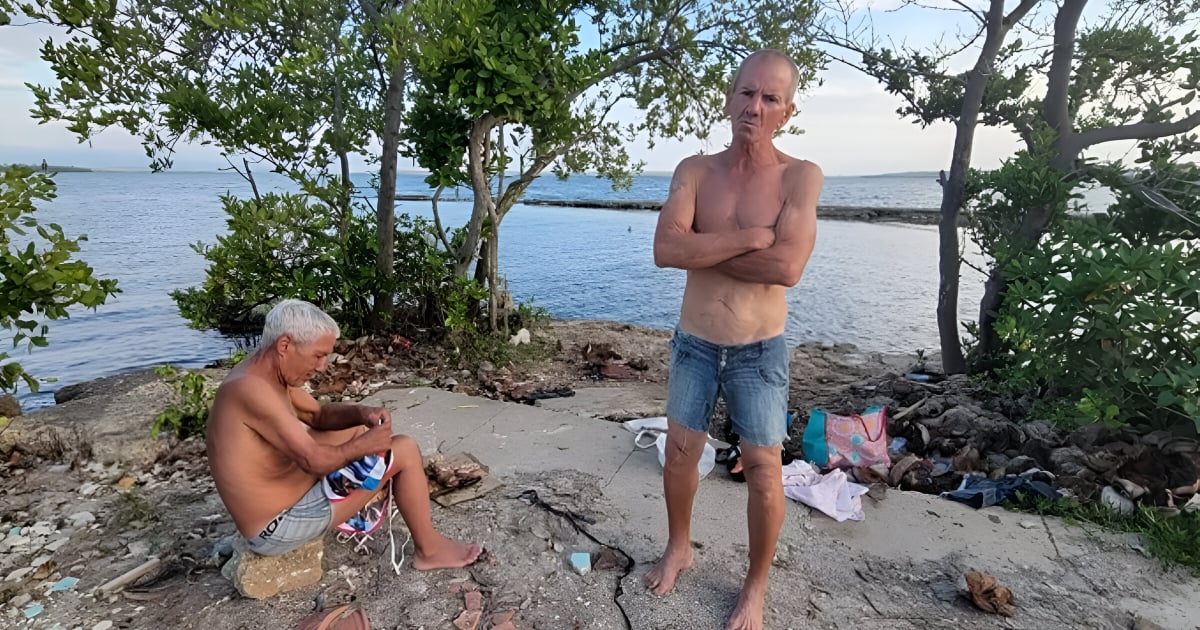The severe economic crisis in Cuba has pushed poverty rates to alarming heights, increasing the number of homeless Cubans who are left to survive on the streets, dependent on their findings or the charity of others, with little hope of improving their living conditions. Juan José, a 59-year-old from Matanzas, is one of the thousands enduring life on the streets, facing numerous hardships due to the lack of housing and income necessary to meet even basic needs, such as food.
Juan José made his way to the city of Cienfuegos, located in the central part of the country, in search of any means to "improve his dire living conditions," as documented in a testimony published by the non-governmental organization Food Monitor Program. The account does not clarify what Juan José did in Matanzas or the circumstances that led him to "move" to Cienfuegos, arriving with only 126 pesos in his pockets—equivalent to about 40 cents—and the hope of finding a "better life."
However, Juan José's existence is exceedingly precarious, lacking the most basic essentials: he has no place to live or family to assist him, and he must seek food or necessary items from trash, the seaside, or by asking others. On the Cienfuegos coast, he found a spot where he could bathe, sleep, and cook on his "makeshift stove" using leftovers scavenged from bins; remains from the shore, often deriving from ritual offerings of Afro-Cuban religion, such as fruits, honey, chicken, goat, and other offerings; and even fish, crustaceans, and other marine life, as the report reveals.
Juan José usually spends his nights in an area along the bay. "I arrived alone, with the little you see here... found this spot back here while walking. It's cool here and you can sleep better if there are no mosquitoes. If there are mosquitoes, you have to make smoke or rub sage on yourself; look at this, those are the sandflies, but if it's cool, there are no mosquitoes and you can sleep," he shared.
"Here on the beach, you find crabs, snails, the conch, which is good if you boil it. You can bathe and boil water, look, I'm here, but I'm clean, see? A lot of discarded food washes up here, and you can easily pick it up from the sand," he added. "There's always food on the coast," he assured, "there are oysters, little shrimp, and small fish that you can fry... I cook them here in a can, boil them, and they're done, with sticks from here, a piece of plastic, cork... anything."
Besides what he obtains from the sea, Juan José searches for food in trash, although—he says—"sometimes people give you something or leftovers from their meals. Look, today I found that pig snout, it's good, once boiled it's clean..." However, he acknowledged that "not every day you can eat, sometimes you go three days without eating or more because there's nowhere to get it."
Nonetheless, he doesn't hesitate to share the little he has when another person, like him, arrives at the spot seeking survival. "To get water, I ask anyone for some and put it in a bottle, or look at the bus terminal or elsewhere, it's not cold, but it quenches thirst," he continued.
Juan José revealed he suffers from diabetes, hypertension, and has had surgery. "I can't exert force or stand guard anymore, and there's no work either, not for someone with these issues, and the pay is useless," he claimed. Despite his health condition, he receives no medical attention or medication. "I once went to the Family Attention System, and they told me I had to wait until I turned 60; that was before Covid, and I haven't gone back," he recounted.
To "earn a little money," the Cuban collects cans to sell, cardboard, aluminum, "whatever comes up." He retrieves plastic bottles from the trash, washes them, and sells them for five pesos. He also trades old clothes and shoes, "which are fixed and sold too," he stated.
The scarcity of basic goods, rampant inflation, and the low purchasing power of the population have significantly contributed to the rise in begging in Cuba. According to the Ministry of Labor and Social Security (MTSS), 3,690 "wandering" individuals were registered in the country between 2014 and 2023.
Meanwhile, a study published in October by the United States Department of Agriculture (USDA) revealed that a total of 4.2 million Cubans, 37.8% of the country's population, experienced food insecurity during 2023. The findings were alarming: 12.8% of Cubans (1.4 million individuals) did not reach the daily threshold of 2,100 calories per capita last year.
The VII Report on the State of Social Rights in Cuba 2024, presented in July by the Cuban Observatory of Human Rights (OCDH), disclosed that 89% of Cuban families live in extreme poverty. The figure represents a one percent increase from 2023 and a 13% rise from 2022.
Understanding Cuba's Economic Hardships
What are the main causes of homelessness in Cuba?
The principal causes of homelessness in Cuba include severe economic crisis, lack of adequate housing, unemployment, and low income, which prevent individuals from meeting basic living needs.
How do homeless individuals in Cuba find food?
Homeless individuals in Cuba often find food by scavenging from trash, collecting leftovers from ritual offerings, fishing, and sometimes receiving donations from others.
What is the current state of poverty in Cuba?
As of 2024, 89% of Cuban families are living in extreme poverty, with 37.8% of the population experiencing food insecurity, according to recent studies.
